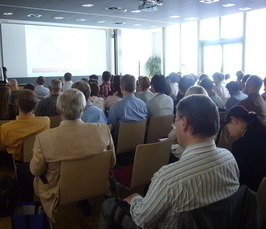CANCELLED: MPI Colloquia Series: Prof. Dr. Christoph Wittmann, Systems metabolic engineering of industrial microorganisms
MPI Colloquia Series: Prof. Dr. Christoph Wittmann, Systems metabolic engineering of industrial microorganisms
- Date: Nov 21, 2019
- Time: 04:00 PM - 05:00 PM (Local Time Germany)
- Speaker: Prof. Dr. Christoph Wittmann
- Institute of Systems Biotechnology, Saarland University
- Location: Max Planck Institute Magdeburg
- Room: Big Seminar Room "Prigogine"
- Contact: sek-bpe@mpi-magdeburg.mpg.de

Unfortunately, this colloquium has to be cancelled (as of 28th October 2019).
The Max Planck Institute Magdeburg invites you to its series of colloquia. Top-class scientists, invited by the Max Planck Institute Magdeburg, give a survey of their research work. Everybody who is interested, is invited to attend.
Systems metabolic engineering of industrial microorganisms
Superior microorganisms that produce chemicals, materials, and fuels from renewables are major drivers of the developing bio-based economy. First, they hold the key to the optimized production of traditional bio-based products regarding key performance indicators such as titer, yield and productivity. Second, they enable future production of important chemicals from green resources rather than from fossil fuels. Systems metabolic engineering is changing the way to design and optimize microbial cell factories for industrial production: the integration of systems biology with new concepts from synthetic biology enables global analysis and engineering of the underlying complex metabolic and regulatory networks and bioprocesses at an efficiency and versatility otherwise not accessible. Meanwhile, model-based metabolic design and engineering can breed synthetic strains, which reach the high performance of classical producers derived over the past decades. This lecture will highlight the development of cell factories and bioprocesses for bio-production of industrial chemicals and materials. In addition, it will present novel approaches that extend the raw material basis to third generation renewables towards a sustainable green chemistry.